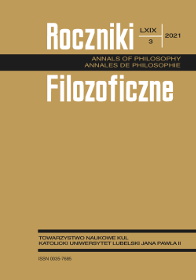The Argument from Divine Hiddenness and Christian Love
Abstrakt
Argument z Bożego ukrycia i chrześcijańska miłość
W artykule argumentuje się, że konceptualne zasoby chrześcijaństwa obalają argument z ukryciu. Według autora zróżnicowanie Bożej miłości poddaje w wątpliwość słuszność rozumowania Schellenberga. Gdybyśmy rozumieli doskonałą miłość jako maksymalną i równą troskę oraz utożsamianie się ze wszystkimi i dla wszystkich, wtedy Boża miłość pociągałaby za sobą Bożą bezstronność, ale z powodu konfliktu interesów między ludźmi doskonała Boża miłość nie może być maksymalna.
Bibliografia
Aquinas, Thomas. Summa Theologica. Translated by English Dominican Fathers. New York: Benziger Brothers, 1947.
Frankfurt, H. G. The Reasons of Love. Princeton, NJ: Princeton University Press, 2004.
Hurtado, Larry. Why on Earth Did Anyone Become a Christian in the First Three Centuries? Milwaukee, WI: Marquette University Press, 2016.
Jordan, Jeff. “Divine Hiddenness and Perfect Love.” The European Journal for the Philosophy of Religion 9, no. 1 (2017): 187–202.
Jordan, Jeff. “The Topography of Divine Love.” Faith & Philosophy 29, no. 1 (2012): 53–69.
McCord Adams, Marilyn. Horrendous Evils and the Goodness of God. Ithaca, NY: Cornell University Press, 1999.
Mill, J. S. On Liberty. London: John Parker and Sons, 1859.
Pascal, Blaise. Pensées: Thoughts on Religion and Other Subjects. Translated by John Warrington, London: J. M. Dent & Sons, 1960.
Schellenberg, J. L. Divine Hiddenness and Human Reason. Ithaca, NY: Cornell University Press, 1993.
Schellenberg, J. L. 2015. The Hiddenness Argument: Philosophy’s New Challenge to Belief in God. Oxford: Oxford University Press.
Searle, John. Mind, Language, and Society: Philosophy in the Real World. New York: Basic Books, 1998.
Copyright (c) 2021 Roczniki Filozoficzne

Utwór dostępny jest na licencji Creative Commons Uznanie autorstwa – Użycie niekomercyjne – Bez utworów zależnych 4.0 Międzynarodowe.





